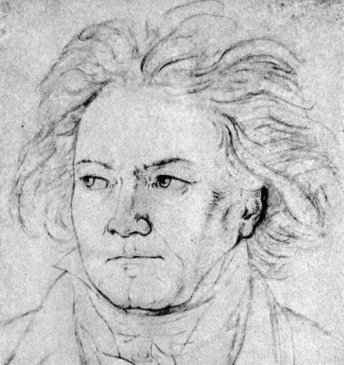2020 – the year of Beethoven?
Posted on 14th January 2020 at 10:41

December 2020 marks the 250th anniversary of Beethoven’s birth.
The event seems to have split the Classical Music community.
Some individuals and organisations see the occasion as an opportunity to celebrate Beethoven’s musical achievements.
Others suggest that Beethoven’s music is popular enough and performances and recordings of it are already so plentiful that audiences should be exploring new repertoire and lesser known composers, and particularly work by underrepresented groups.
Beethoven is one of a group of composers from the Western Classical tradition who is often given the title ‘genius’. He was a prolific composer, writing 722 works, including 9 Symphonies, 16 overtures and incidental pieces, 16 string quartets, 32 piano sonatas, 20 sets of variations for piano, 10 works for chorus and orchestra, hundreds of songs, operas, piano trios, works for wind ensembles and concertos for violin, piano and a lost work for oboe. His development of musical forms such as the symphony, string quartet and piano sonata are seen as revolutionary, and his influence on later composers is often cited.
If you want to take 2020 as the year to explore Beethoven’s works further, check out #TheCompleteBeethoven on Twitter for advice from The Symphonist or follow the hashtag #Beethoven2020.
Beethoven led an interesting life. His father was abusive, he struggled with his health, he lived in politically turbulent times, his romantic life was complicated and he suffered hearing loss. However there are stories of his bad temper and of his poor treatment of his sister-in-law and nephew. All these elements add to the image of a tortured genius, a persona that has appealed to audiences and, it could be argued, has helped keep his music popular over the past 200 years.
As Beethoven’s work is frequently performed, recorded and broadcast on radio, should we take his 250th anniversary as an opportunity to enjoy ever popular works such as his 9th Symphony and 5th Piano Concerto, or should we explore some of his lesser known works, such as his works for military band…
or his songs…
Or should we be exploring more obscure composers? As William Gibbons states on Twitter:
"Every time I listen to Beethoven, I’m not listening to something else."
Inspired by some of the discussion around exploring a wider range of composers, Musicology Duck’s blog influenced by Book Riot’s Read Harder Challenge, has suggested a hashtag of #ListenWider. Rather than recommending specific books or pieces, both challenges give categories, allowing readers and listeners to find works that appeal to them. Musicology Duck gives 30 categories of pieces to listen to including a composition of 60 minutes or more in length by a woman or non-binary composer, a miniature composition under 90 seconds long, a top hit from the year you were born or from a country other than your own, and a concerto for tuba, bassoon or double bass.
You could take the opportunity to explore works by other composers and performers who have key anniversaries in 2020, such as:
Dave Brubeck – 100th anniversary of his birth
Dorothea Anne Franchi – 100th anniversary of her birth
Ravi Shankar – 100th anniversary of his birth
Del Woods – 100th anniversary of her birth
City of Birmingham Symphony Orchestra (CBSO) – 100th anniversary
John Rutter – 75th Birthday
Of course, there is a happy medium for those who love Beethoven’s music but still want to discover new repertoire. Ensembles such as the English Symphony Orchestra are taking the opportunity to partner Beethoven’s works with lesser known composers such as Ruth Gipps and Adrian Williams.
So how will you approach your year of listening to music? Let us know what you think in the comments!
Tagged as: BEETHOVEN, BEETHOVEN 9TH SYMPHONY, CLASSICAL MUSIC, FAMOUS COMPOSERS, LUDWIG VAN BEETHOVEN, MINORITY GROUPS, MINORITY GROUPS IN MUSIC, MUSIC, MUSIC COMPOSERS, MUSIC COMPOSITION, MUSIC HISTORY, MUSIC WORKSHOP COMPANY, POPULAR CLASSICAL MUSIC, POPULAR COMPOSERS, RAVI SHANKAR, UNDERREPRESENTED COMPOSERS, WOMEN COMPOSERS
Share this post:




